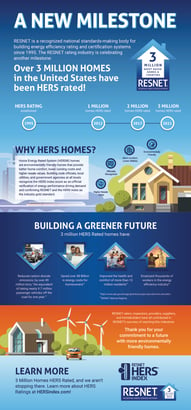 This week, Residential Energy Services Network (RESNET) reported that 313,153 homes received a Home Energy Rating System (HERS) Score in 2021. The number of HERS homes continues to break records, having eclipsed the 299,775 in 2020. More than 3 million homes have been rated since the inception in 1995 of HERS scores, which are a home’s equivalent of a miles-per-gallon rating for cars.
This week, Residential Energy Services Network (RESNET) reported that 313,153 homes received a Home Energy Rating System (HERS) Score in 2021. The number of HERS homes continues to break records, having eclipsed the 299,775 in 2020. More than 3 million homes have been rated since the inception in 1995 of HERS scores, which are a home’s equivalent of a miles-per-gallon rating for cars.
What a HERS Index Score Means
The HERS Index Score is a nationally recognized system for inspecting and calculating a home’s energy performance. HERS homes have environmental values as they are designed to provide better comfort, lower operating costs, and generally higher resale values. RESNET certified HERS Raters assess the energy efficiency of the home, considering variables like exterior wall construction, unconditioned spaces, ceiling and roof construction, and insulation. The energy efficiency of the home is then scored and entered into a database. (Fun fact: You can look up a home’s address to see if it’s HERS-rated.)
Using the 2006 International Energy Conservation Code (IECC) as a reference home with a 100 score, homes are compared with the efficiency of that home and assigned a rating compared to that home. The lower the score, the more energy-efficient the home.
HERS Ratings in 2021 by the Numbers
Although HERS-rated homes are popular nationwide, the top five states for HERS-rated homes by volume in 2021 are Texas (70,314), Arizona (23,135), Florida (22,357), North Carolina (20,370), and Colorado (17,616). Click here to view the number of HERS-rated homes activity by state.
Interestingly, the states with the lowest average HERS Index Scores last year were California (33), Vermont (38), Alaska (40), Maine (41), and South Dakota (43). Although each of those states had a relatively small number of homes rated, their absolute HERS index scores were very low.
The Bottom Line
There are myriad benefits to energy-efficient homes. The expansion of HERS-rated homes is positive for builders, buyers, and the environment, as a more efficient home conserves energy, lowering greenhouse gas emissions. The fact that the number of HERS homes has continued to grow year-over-year is a signal of the growing recognition of the value of energy efficiency in the marketplace.
RESNET Executive Director Steve Baden said the organization is not content with the current market share. “In 2022, RESNET is launching its initiatives that will include increasing the demand for HERS Raters’ services through new opportunities in energy code compliance, water efficiency rating, and rating the installation of HVAC systems.
To learn more about RESNET’s 2022 Priorities, click here.





